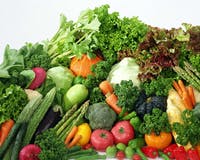The battle to get children to eat their greens is something most parents will be familiar with - unfortunately, the allure of broccoli pales into insignificance when there might be a chance of something starchy or even sweet on the cards.
However, a new study suggests starting early could ensure mums and dads win the war - and that making fruit and veg fun is likely to provide a significant strategic advantage.
Let's take a look at the research and then delve into some games that should turn kids into lifelong lovers of healthy, nourishing foods.
Familiarity creates enthusiasm for fruit and veg
The latest study was carried out at the University of Reading and involved 92 children from six nurseries, all of whom were aged between 12 and 36 months.
Every day for four weeks, they were provided with sensory activities using unfamiliar foods such as broad beans, pomegranates, rhubarb and sweet potato. For instance, they might be asked to touch the produce or smell it.
At the end of the study period, a mealtime test was carried out with both these youngsters and a control group to see if the children made different food choices after the sensory tasks.
It was found that the toddlers touched 66 per cent of the vegetables they had enjoyed the activities with, whereas they only went for 49 per cent of the additional, unfamiliar produce that was also on the table.
Furthermore, the children who had prodded and smelt the vegetables were almost a third more likely to taste them than their counterparts in the control group.
The researchers said this is a significant discovery after the recent National Diet and Nutrition Survey found that only one in five youngsters currently manages to eat the recommended five portions of fruit and vegetables each day.
Lead author of the report Dr Carmel Houston-Price said: "Fruit and vegetables are the cornerstone of a healthy diet. By developing a fondness for a wide variety of healthy foods toddlers stand the best chance of having a 'five a day' diet later in life."
She added that using fun familiarisation activities could help parents to avoid the frustration and messy floors that can come with getting toddlers to try something new.
Why not try the following games at home?
Fruit and veg grab
Place a variety of different fruits and veg in a basket at one side of the room or garden and get the child (or children) to stand at the other. Shout out the name of one of the items at random and then get them to run across to the basket, find it and bring it back to the starting point. If you're playing with more than one child, pit them against each other to see who can be the fastest, or use a stopwatch and just try to beat previous times if there's only one youngster.
ABCs of produce
Again using a selection of fruit and veg, set a stopwatch for 30 seconds and then ask your child to sort the items into alphabetical order. This is best suited for older children, but you could amend it for size order with younger ones.
On the spot
This is a nice game for groups of kids, but you can also play it with your own offspring one-on-one. Get everyone in a circle (or face to face) and give one person a beanbag. The person with the beanbag says a colour and then throws it to one of the other players, who must name a fruit or veg of that colour as they catch it. They then choose their own colour and throw the beanbag to another player, who must name a piece of produce of that hue. Again, this might be better for slightly older kids, but toddlers should still enjoy it with a little more time to come up with answers.
Match that fruit
Print out a selection of images of fruit and veg from the internet, or cut them from magazines if you can find enough. Place them in random order on the floor or table and give the child a set amount of time to match all those that are the same type of produce before the 'buzzer' goes.
What am I?
A variation on an old classic, this just requires you to choose a piece of fruit or veg (either in your head or a real item from the fruit bowl) without telling your child what it is. They can then ask questions with yes or no answers to try to identify it.
All of these fun activities should ensure your little ones are learning to love fresh food without even realising it - and that could make mealtimes much easier for mums and dads.




